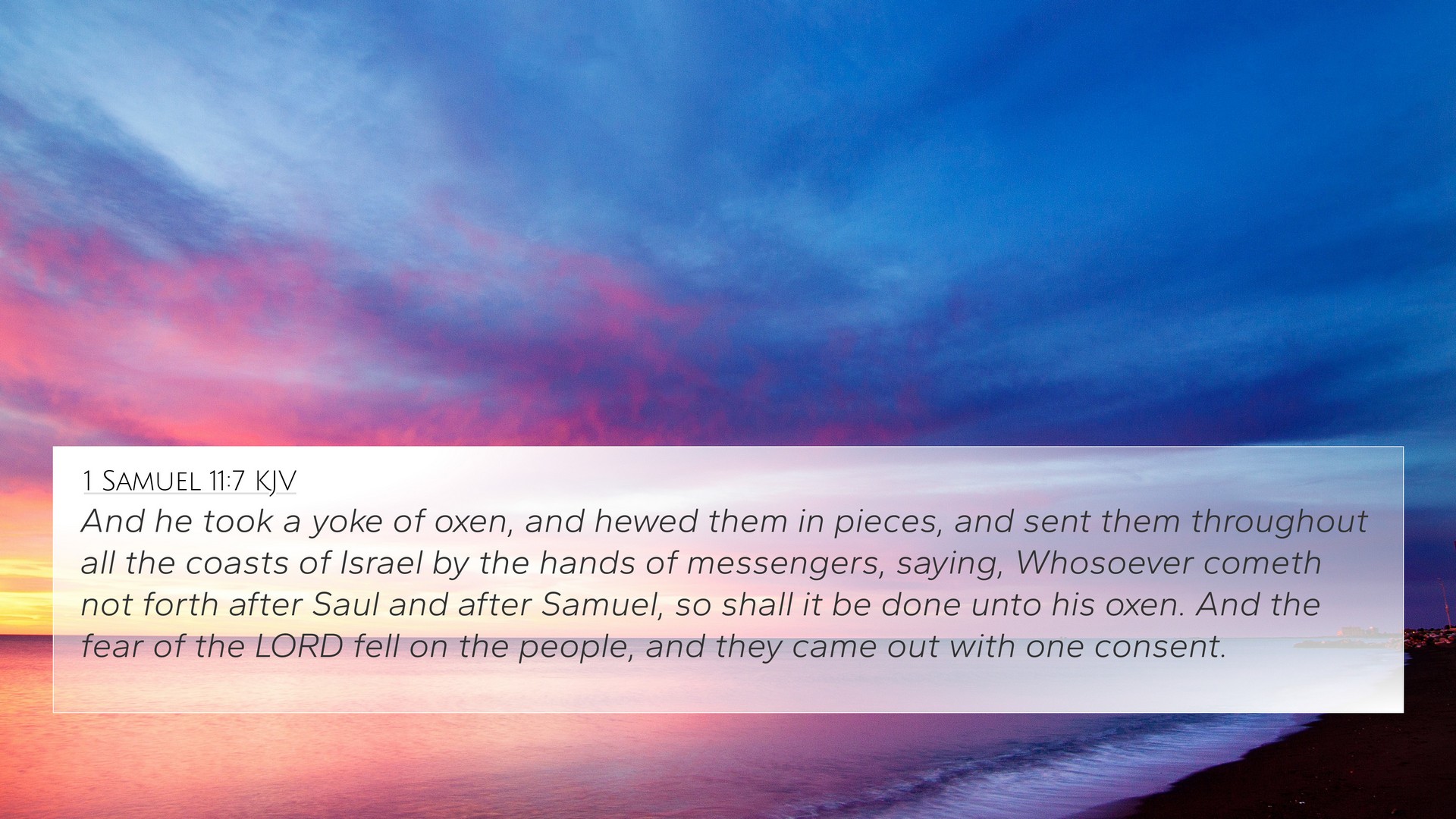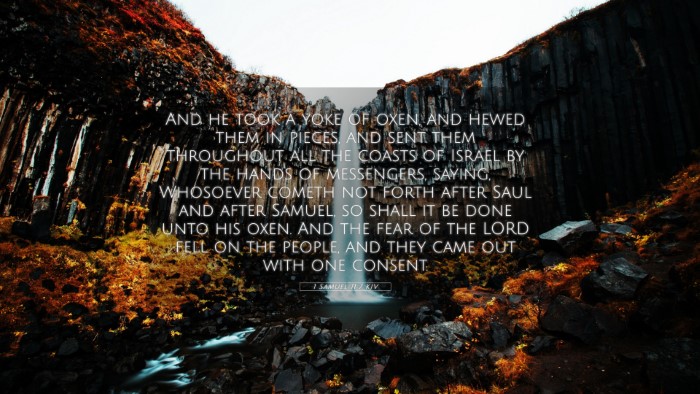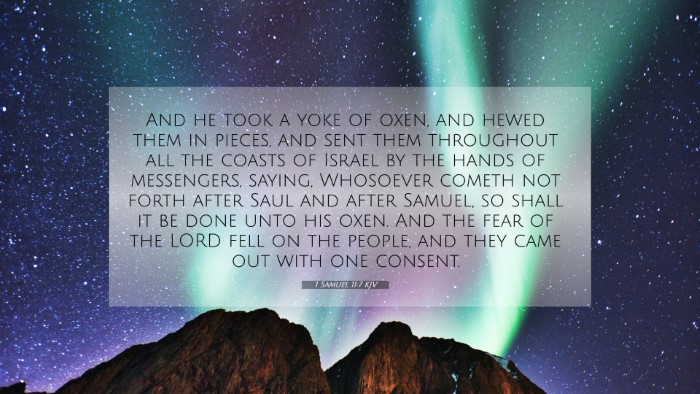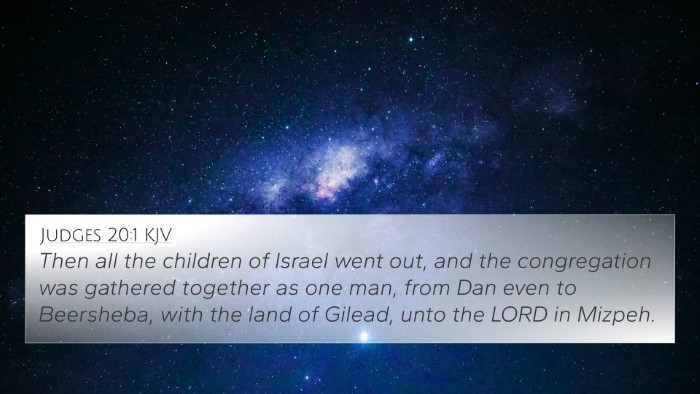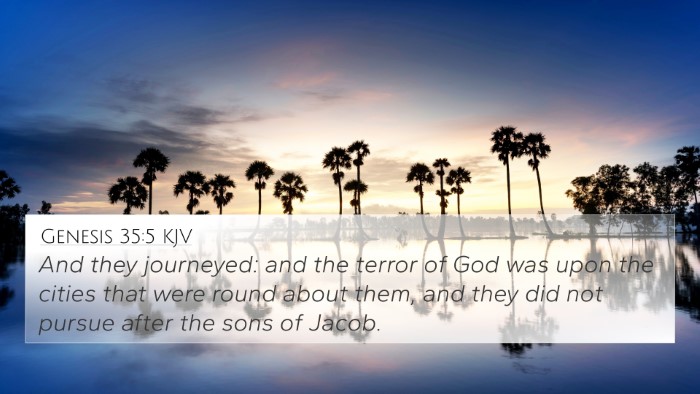Understanding 1 Samuel 11:7
1 Samuel 11:7 reads: "And he took a yoke of oxen, and cut them in pieces, and sent them throughout all the coasts of Israel by the hands of messengers, saying, Whosoever cometh not forth after Saul and after Samuel, so shall it be done unto his oxen. And the fear of the Lord fell on the people, and they came out with one consent."
Context and Background
In this passage, Saul has just been chosen as king over Israel after the nation faced the threat from Nahash the Ammonite. The verse highlights Saul's decisive action to rally the people against a common enemy, demonstrating both his emerging leadership and the need for national unity.
Commentary Insights
-
Matthew Henry's Commentary:
Henry emphasizes Saul’s dramatic call to arms, using the visceral imagery of cutting the oxen to convey the seriousness of their situation. This act symbolizes the consequences of inaction and binds the people together in a collective cause, demonstrating Saul's authority and commitment to protect Israel.
-
Albert Barnes' Notes:
Barnes points out that Saul's action incited a fear of the Lord among the people, illustrating that divine influence played a critical role in motivating them. It shows the effectiveness of a leader's boldness coupled with a sense of urgent spiritual responsibility.
-
Adam Clarke's Commentary:
Clarke notes that the fear induced by Saul's message was not merely a fear of punishment but an awakening to their covenant responsibilities as the people of God. Their response illustrates a revival of national spirit under Saul’s leadership.
Thematic Connections
This verse offers several thematic connections within the Biblical narrative:
- Leadership and Authority: Saul emerges as a leader ready to defend Israel, similar to other leaders like Moses and Joshua.
- The Fear of the Lord: The fear that falls on the people aligns with themes found throughout the Bible concerning reverence for God's power.
- Unity Against Adversity: The rallying of the people echoes the collective efforts seen during the battles led by figures like David and Gideon.
Cross References
1 Samuel 11:7 reflects and connects to several other biblical passages, enriching its understanding:
- Judges 6:34 - The Spirit of the Lord came upon Gideon, emphasizing divine empowerment for leadership.
- 1 Samuel 10:6 - Spirit of the Lord rushing upon Saul, marking his anointing and leadership commission.
- Exodus 14:31 - The fear of the Lord among the Israelites as they witness God’s deliverance.
- Deuteronomy 20:1 - A call to unity against common threats and assurance of God’s presence in battles.
- 2 Chronicles 20:15 - Another instance of God’s call for unity against an enemy, emphasizing reliance on Him.
- Acts 5:11 - The fear of the Lord falling upon the early church reflecting divine authority and integrity.
- Nehemiah 4:14 - Rallying the people to defend against adversaries, echoing collective effort under duress.
Application and Reflection
For modern believers, 1 Samuel 11:7 serves as a reminder of the importance of unity in facing challenges, the role of strong leadership, and the reverence due to God. Each believer is called to respond to urgent spiritual needs in their communities, fostering a spirit of cooperation and collective action rooted in faith.
Conclusion
The implications of 1 Samuel 11:7 extend far beyond the immediate context of Israel’s battle. They present an opportunity for introspection on how collective faith and action can manifest in today's world, serving as a model for believers to engage courageously in spiritual warfare and unified service to the Lord.
